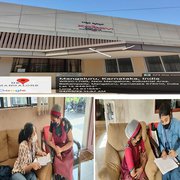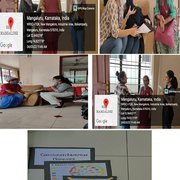Assessment of health parameters in Female factory workers: Dept. of MSc(FSN)
Assessment of health parameters in Female factory workers was done by the students of III semester of Department of P.G Studies in Food Science and Nutrition on 04-03-2022. The activity was conducted in Kalbavi Cashew industry ,Mangalore.
Target group:
The nutritional assessment of the female factory workers of age group 28-46 years was done by anthropometric measurements , clinical sign detection and dietary assessment. The anthropometric measurements that were used are :
- Height measurements
- Weight measurements
- Hip and waist measurements
In clinical sign analysis the parts of the body such as hair , face , eyes , lips, tongue, teeth, gums,were examined to see if any abnormalities were present. In order to interpret the physical activity level of the individual , their daily physical activity was recorded and they were categorized into sedentary ,moderate, or heavy workers.
The dietary assessment was carried out by obtaining details about their dietary intake pattern using frequency of the food groups consumed and 24-hour diet recall. Based on the calculations their nutritional intake was interpreted.
Interpretation:
The results obtained after the assessment were statistically analysed. The diet survey conducted on a female factory workers were mostly women who belonged to a poor economic status. The community nutrition program was conducted for factory working female individuals. It could be conducted due the deficiencies of micronutrients, which exhibited minor clinical health problems among those female workers. The target group lacked in protein due to insufficient consumption of foods with high biological value proteins. Their intake of both animal sources and vegetarian sources of proteins were low. The target group also lacked in several micronutrients like that of iron, calcium and other vitamins and minerals due to their low intake of green leafy vegetables and other vegetables and in some individuals the regular allowances of foods are imbalanced and cooperatively low.
Outcome:
The study conducted showed that the female factory workers, due to the deficiencies of micronutrients and minor clinical health problems consumed a very low and imbalanced diet.
ORGANISING NUTRITION EDUCATION PROGRAMME AT COMMUNITY LEVEL
Nutrition education programme was carried out for the factory women working in the Kalbhavi cashew factory on 04.03.2022 after interpreting the results of the study conducted on assessment of the nutritional status for the same population in order to improve their dietary pattern and lifestyle changes.
The nutrition education programme was carried out by using few teaching aids such as
- Placards
- Posters
- Pamplets
All the teaching aids were displayed with dietary suggestions, awareness of deficiency of micronutrients and a nutrition education programme was organised successfully.


